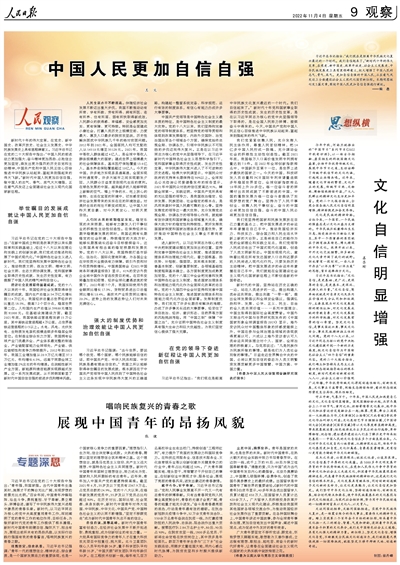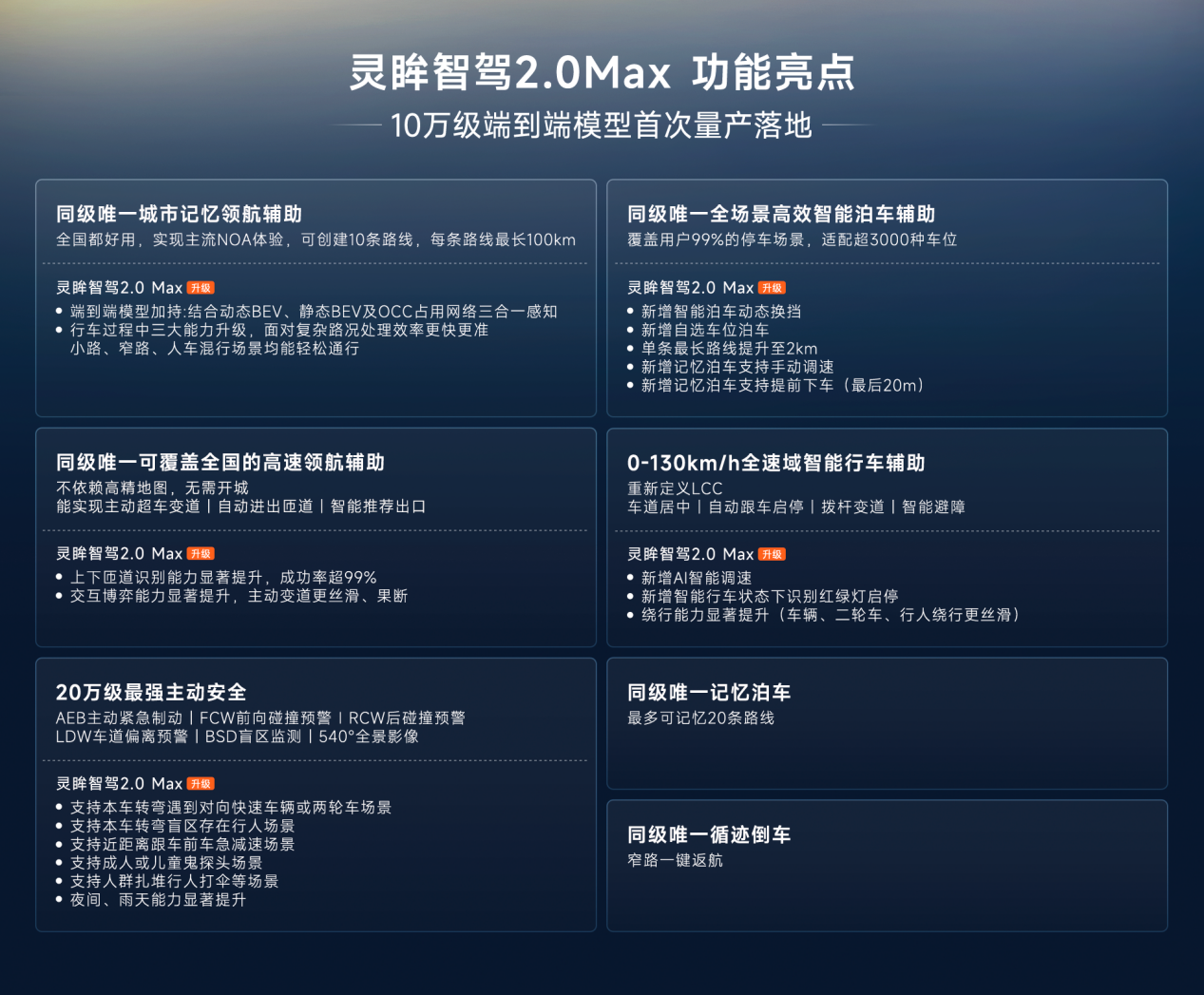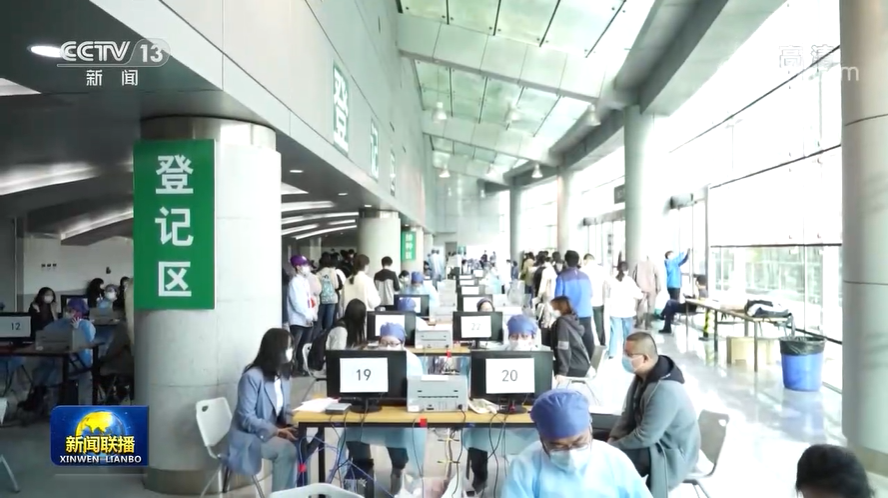
People’s Daily (November 04, 2022, 09 edition)
General Secretary of the Supreme Leader pointed out: "We are now an era closest to the cultural revival of the Chinese nation. We are confident. " The great changes in the new era in the past ten years are of milestone significance in the history of the Party, the history of New China, the history of reform and opening up, the history of socialist development and the history of the development of the Chinese nation, and have greatly enhanced the ambition, backbone and confidence of the people of China. The people of China, who are more confident and self-reliant, are marching on a new journey of building a socialist modern country in an all-round way. This issue of the observation edition published three articles, focusing on China people’s self-confidence and self-improvement.
— — Editor
People in China are more confident and self-reliant (People Watch)
Wang Wen
The great changes in the new era in the past ten years are of milestone significance in the history of the party, the history of New China, the history of reform and opening up, the history of socialist development and the history of the development of the Chinese nation. General Secretary of the Supreme Leader pointed out in the party’s Report to the 20th CPC National Congress: "The people of China have stronger forward momentum, higher spirit of struggle, firmer belief in winning, and stronger historical consciousness and initiative. The people of the Communist Party of China (CPC) and China are advancing the great leap of the Chinese nation from standing up, becoming rich and becoming strong with confidence." In the new era, the people of China are more confident and self-reliant, and their ambition, backbone and confidence to be Chinese have been greatly enhanced, and they are striding on a new journey of building a socialist modern country in an all-round way.
The remarkable development achievements have made the people of China more confident and self-reliant.
General Secretary of the Supreme Leader pointed out in the party’s Report to the 20th CPC National Congress: "On the basis of long-term exploration and practice since the founding of New China, especially since the reform and opening up, our party has successfully promoted and expanded Chinese modernization through theoretical and practical breakthroughs since the 18th National Congress." When Socialism with Chinese characteristics entered a new era, our Party adhered to and developed Socialism with Chinese characteristics, promoted the coordinated development of material civilization, political civilization, spiritual civilization, social civilization and ecological civilization, and made historic achievements and changes in the cause of the Party and the state, which effectively boosted the spirit and self-confidence of the people of China.
Significant achievements have been made in economic and social development. In the ten years since the 18th National Congress of the Communist Party of China, China’s economic and social development has made remarkable achievements. The gross domestic product has increased from 54 trillion yuan to 114 trillion yuan, and the proportion of China’s total economic output in the world economy has reached 18.5%, an increase of 7.2 percentage points, ranking second in the world. The per capita GDP increased from 39,800 yuan to 81,000 yuan. In terms of infrastructure construction, by the end of 2021, China’s railway operating mileage exceeded 150,000 kilometers, of which the high-speed rail operating mileage exceeded 40,000 kilometers, accounting for more than two-thirds of the world’s high-speed rail operating mileage. The installed capacity of hydropower, wind power, photovoltaic power generation and biomass power generation has been ranked first in the world for many years. In terms of the comprehensive strength of manufacturing industry, China has the most complete industrial categories and the most complete industrial system in the world, and the supporting capacity of industrial chain is leading the world, and the toughness and competitiveness of industrial chain and supply chain continue to improve. From 2012 to 2021, China’s industrial added value increased from 20.9 trillion yuan to 37.3 trillion yuan, with an average annual growth rate of 6.3%, much higher than the average annual growth rate of global industrial added value of about 2% in the same period. In terms of strategic emerging industries, new energy and clean energy have achieved leap-forward development. This series of development achievements shows China’s self-confidence and spiritual outlook in the new era from different aspects.
People’s living standards are constantly improving. With the great strides made in economic and social development, China has continuously promoted education for young children, education for learning, income from labor, medical care for the sick, support for the old, housing and support for the weak, and achieved new results. The people’s sense of acquisition, happiness and security is more substantial, secure and sustainable. In particular, we will build a well-off society in an all-round way, win the unprecedented, strongest and most populous battle against poverty in human history, and historically solve the problem of absolute poverty that has plagued the Chinese nation for thousands of years. From 2012 to 2021, the per capita disposable income of the national residents increased from 16,510 yuan to 35,128 yuan. In 2021, the number of middle-income groups in China exceeded 400 million, making it the largest country in the world. The largest social security system in the world has been built, with 1.36 billion people covered by basic medical insurance and more than 1 billion people covered by basic old-age insurance. In today’s China, many places have achieved high-speed access to counties and broadband access to every village, and many big cities have achieved frequent visits, and people are increasingly enjoying the convenience of modern life. In the green development of China, more and more people can breathe fresh air, drink clean water, eat safe food and live in a livable environment, and truly feel the tangible environmental benefits brought by economic and social development. The yearning for a better life has come true, making Chinese more proud of yesterday, more at ease for today and more confident for tomorrow.
People are stable and optimistic about future expectations. A stable and optimistic future expectation can effectively stimulate people’s enthusiasm, initiative and creativity in starting a business. While maintaining long-term stable and healthy economic development, China also has a long-term stable social environment, sustained and stable major policies, and can continue to struggle around long-term goals, which gives China a fairly high stability expectation and development advantage. Since the 18th National Congress of the Communist Party of China, China has continuously created a market-oriented, rule-of-law and international business environment, which has provided a strong guarantee for enterprises from all countries to invest in China and attracted foreign investment and foreign investment to grow continuously. According to the 2021 Business Environment Survey Report of American Chamber of Commerce in China, 61% of the foreign-funded enterprises surveyed chose China as their preferred investment destination. Against the background of the century-old political changes and the counter-current economic globalization, in the first seven months of 2022, the actual amount of foreign capital used in China increased by 17.3% year-on-year, the total value of import and export of goods increased by 10.4% year-on-year, and the investment in high-tech industries increased by 20.2% year-on-year. The development trend of rising against the trend made people full of confidence in the future.
Strong institutional advantages and governance efficiency have made China people more confident and self-reliant
General Secretary of the Supreme Leader stressed: "In today’s world, if any political party, country or nation can be confident, then the Communist Party of China (CPC), People’s Republic of China (PRC) and the Chinese nation have the most reasons to be confident." The fundamental reason why China has achieved remarkable development achievements is that the Communist Party of China (CPC) led the people of China to find Socialism with Chinese characteristics, the correct way to realize the great rejuvenation of the Chinese nation, and built a complete, scientific, standardized and effective institutional system, which is confident and capable of doing many important things.
The Communist Party of China (CPC)’s leadership is the most essential feature of Socialism with Chinese characteristics and the greatest advantage of Socialism with Chinese characteristics system. Since the 18th National Congress of the Communist Party of China, we have adhered to and improved the system of the Party’s leadership, implemented and embodied the adherence to the Party’s leadership in all fields, including reform, development and stability, internal affairs, foreign affairs and national defense, and managing the Party, the country and the army, ensuring that the Party always takes the overall situation into consideration and coordinates all parties, and leading the Chinese nation to a great rejuvenation at an unstoppable pace. It is under the strong leadership of the CPC Central Committee with the Supreme Leader as the core, and under the guidance of Socialism with Chinese characteristics Thought in the new era of the Supreme Leader, the cause of the party and the country has made historic achievements and undergone historic changes, and the great rejuvenation of the Chinese nation has entered an irreversible historical process. According to the Harvard University poll, China people’s support rate for the government has remained above 90% for a long time. According to a report released by Edelman, a world-renowned public relations consulting company, in 2021, the people of China have a trust in the government as high as 91%, ranking first in the world. Practice has proved that the Communist Party of China (CPC)’s incomparable strong leadership is the fundamental point of China’s political stability, economic development, national unity and social stability, and is the most reliable backbone of the people of China when storms strike. Insisting on giving full play to the greatest advantage of the Party’s leadership and giving full play to the Party’s core role of commanding the overall situation and coordinating all parties, we can effectively coordinate the major relations between the Party and the state in all fields, ensure the stability and continuity of major policies, give full play to the remarkable advantages of China’s national system and national governance system, and better promote the continuous development of Socialism with Chinese characteristics’s cause.
In the new era, the CPC Central Committee with the Supreme Leader as the core has put the system construction in a more prominent position, adhered to and improved the Socialism with Chinese characteristics system, promoted the modernization of the national governance system and governance capacity, focused on consolidating the foundation, promoting the advantages, supplementing the shortcomings and strengths, building the fundamental system, improving the basic system and innovating important systems, basically established the basic institutional framework in various fields, and made all aspects of the system more mature and stereotyped. The Third Plenary Session of the 18th CPC Central Committee took the improvement and development of the Socialism with Chinese characteristics system and the modernization of the national governance system and governance capacity as the overall goal of comprehensively deepening reform. The Fourth Plenary Session of the 19th CPC Central Committee made comprehensive arrangements for upholding and improving the Socialism with Chinese characteristics system and promoting the modernization of the national governance system and governance capacity. By giving full play to the advantages of the system, we have overcome many long-standing unsolved problems, accomplished many long-term major events, and withstood the test of risks and challenges from politics, economy, ideology and nature. Using the "China system" to guarantee the "rule of China" fully proves that the Socialism with Chinese characteristics system has great vitality and superiority, which provides a strong support for our firm confidence.
The new journey of forging ahead under the leadership of the Party has made the people of China more confident and self-reliant.
General Secretary of the Supreme Leader pointed out: "We are now an era closest to the cultural revival of the Chinese nation. We are confident. " The historic achievements and changes in the cause of the party and the state in the new era in the past ten years have been achieved under the strong leadership of the CPC Central Committee with the Supreme Leader as the core, and through the hard work and continuous struggle of the people throughout the country. Today, the people of the Communist Party of China (CPC) and China are confidently pushing forward the great leap of the Chinese nation from standing up, becoming rich and becoming strong.
Our party closely relies on the people, gives full play to the people’s main role, respects the people’s initiative, ties more than 1.4 billion people in China into a rope, and fully mobilizes the enthusiasm, initiative and creativity of the whole society. By the end of 2021, the number of high-value invention patents per 10,000 population in China reached 7.5. In the ranking of global innovation index in 2022, China jumped to 11th place, making it one of the fastest-growing countries in the world. In today’s China, the total number of R&D personnel and the number of PCT international patent applications have been ranked first in the world for many years, and the global innovation index has risen by more than 20 places in the past 10 years. Every struggler’s hard work and dedication have jointly achieved the continuous progress of China, and the vigorous development of China has provided a broad stage for every struggler to realize his dream. Insist on starting a business for and relying on the people’s officers, China will be more confident and self-reliant, and the people of China will be more confident and self-reliant.
Our party insists on putting the development of the country and the nation on the basis of its own strength, firmly holds the fate of China’s development and progress in its own hands, and pushes China’s economic strength, scientific and technological strength, comprehensive national strength and people’s living standards to a new level. It is taking our own way as the whole theoretical and practical foothold of the party that our party has successfully led the people out of the road of Chinese modernization and created a new form of human civilization. China’s modernization means that more people than the combined population of all developed countries will enter the ranks of modernization. As long as we carry forward the historical initiative and firmly hold the destiny of China’s development and progress in our own hands, we can constantly create new miracles in China on the new journey of building a socialist modern country in an all-round way.
In the new era, China insists on standing on the right side of history and on the side of human progress, proposing to build a community of human destiny, proposing to jointly build the "Belt and Road", proposing global development initiatives and global security initiatives, and emphasizing the common values of all mankind & HELIP; … A series of China ideas and China ideas have been highly praised by the international community. The 2019 Global Survey Report on China’s National Image released by the Institute of Contemporary China and World Studies of the Chinese Foreign Languages Bureau shows that the goodwill of overseas respondents to China’s overall image continues to rise, and China’s performance in participating in various fields of global governance is highly recognized. More than 60% of overseas respondents recognize the positive significance of the concept of community of human destiny to individual, country and global governance. Marx said: "whatever a nation does as a nation is what it does for human society." China, which is approaching the center of the world stage, will surely contribute more China wisdom, China plan and China strength to the prosperity and development of human civilization with a more confident attitude.
(The author is the Executive Dean of Chongyang Financial Research Institute of Renmin University of China)
Cultural self-confidence has been significantly enhanced (thinking vertically and horizontally)
Jiang Shengyu
This year’s Mid-Autumn Festival, the China Festival series "Wonderful Mid-Autumn Festival Tour in 2022" launched by Henan Satellite TV, with a cultural feast of national tide of science and technology, which is a blend of ancient and modern, virtual and real, promotes the excellent traditional Chinese culture, shows the beauty of Chinese festivals, vividly interprets the cultural connotation of the traditional Mid-Autumn Festival and resonates with the audience. In recent years, with the prosperity of the cultural market and the development of the cultural industry, the traditional festivals, cultural relics and museums have continued to heat up, and the spiritual and cultural life of the broad masses of the people has become richer. Report to the 20th CPC National Congress of the Party pointed out that the cultural self-confidence of the whole Party and the people of all ethnic groups in China has been significantly enhanced, and their mental outlook has become more energetic.
Culture is the spiritual lifeline of a nation. Throughout the ages, the prosperity of a country and a nation has always been supported by cultural prosperity. One of the most important reasons why the Chinese nation has been born endlessly and suffered setbacks is that it has a unique and profound Chinese culture. Since the reform and opening up, there have been frequent cultural exchanges between China and foreign countries, and many new cultural elements have broadened our horizons. However, there was a time when some people had the idea of "respecting foreign countries" and "taking foreign countries as beauty" and blindly pursued western culture.
General Secretary of the Supreme Leader pointed out: "Cultural self-confidence is a more basic, broader and deeper self-confidence and a more basic, deeper and more lasting force." Cultural self-confidence, simply speaking, is the full recognition and active practice of one’s own culture and its intrinsic value, which is mainly manifested in rational cognition of the process of cultural development, reverence and pride for cultural development achievements, scientific grasp of cultural development ability, and confidence and hope for cultural development prospects. Strengthening cultural self-confidence is a major issue related to the rise and fall of national luck, cultural security and the independence of national spirit. Since the 18th National Congress of the Communist Party of China, the CPC Central Committee with the Supreme Leader as the core has promoted cultural construction to a new historical height and regarded cultural self-confidence as the important content of Socialism with Chinese characteristics’s "Four Self-confidences". Report to the 20th CPC National Congress of the Party pointed out that we have established and adhered to the fundamental system of Marxism’s guiding position in the ideological field. In the new era, the Party’s innovative theory has been deeply rooted in people’s hearts, socialist core values have been widely spread, Chinese excellent traditional culture has been creatively transformed and innovatively developed, cultural undertakings have become increasingly prosperous, the network ecology has continued to improve, and the situation in the ideological field has undergone an overall and fundamental change.
Keeping the right and opening up the new is full of weather. In the past ten years, the people of China have become more passionate about their own culture, and their cultural self-confidence has obviously increased. National customs and tides have sprung up one after another, and cultural displays such as the 24 solar terms, the water of the Yellow River and the love of folding willows at the Beijing Winter Olympics have perfectly integrated Chinese culture and ice and snow sports; A large number of masterpieces have emerged on the screen, screen and stage, and outstanding cultural works such as The Battle at Lake Changjin and Minning Town’s "Only Green" are applauded and popular; Cultural variety shows frequently appear in circles, such as Chinese Poetry Conference, Reader and National Treasure, which highlight the spiritual height with cultural thickness and bring phenomenal traffic; Red tourism has become the travel choice of many people. Revolutionary museums, memorial halls and remains of sites allow people to inherit the red gene … … China people’s cultural self-confidence is manifested in many aspects. People respect Chinese culture from the heart and identify with it from the depths of spirit. They are more conscious of inheriting Chinese cultural genes, and their sense of cultural belonging and pride are significantly enhanced. They are more confident and capable of creating new glories of Chinese culture.
The elders who seek wood must consolidate their roots; Those who want to flow far away will dig their fountains. Cultural self-confidence is based on rich cultural background. China’s excellent traditional culture, revolutionary culture and advanced socialist culture nurtured in the great struggle of the Party and the people over 5,000 years of civilization development accumulate the deepest spiritual pursuit of the Chinese nation and represent its unique spiritual identity, which is the foundation of our cultural self-confidence. Cultural development is inherited, while innovation and creation endow culture with new vitality, make culture more attractive and make cultural self-confidence more firm. We stick to the position of Chinese culture, persist in creative transformation and innovative development, combine the characteristics and requirements of the times, make the most basic cultural genes of the Chinese nation adapt to contemporary culture and coordinate with modern society, and strive to educate people with all the spiritual wealth created by the Chinese nation.
Wen Yun is linked with the national movement, and the context is linked with the national context. Realizing the great rejuvenation of the Chinese nation is a great cause that shakes the past and shines the present, and needs the support of great spirit. Embark on a new journey to achieve the goal of the second century, inherit the unique concept, wisdom, tolerance and charm of Chinese culture, and soak up the cultural nutrients accumulated by the long struggle of the Chinese nation. We have great spiritual strength by taking the road of Socialism with Chinese characteristics. On the new journey, by strengthening cultural self-confidence, enhancing cultural consciousness and constantly stimulating the creative vitality of the whole nation’s culture, we can overcome all difficulties and challenges without fear, and we can unswervingly open up new horizons and create new miracles.
Sing the song of youth for national rejuvenation
Show the high-spirited style of China youth (special topic thinking)
Zhang Jian
General Secretary of the Supreme Leader pointed out in the Party’s Report to the 20th CPC National Congress: "If the youth is strong, the country will be strong. Contemporary young people in China are born at the right time, and the stage for displaying their talents is extremely broad, and the prospect of realizing their dreams is extremely bright. " For more than a hundred years, young people in China have fought bloody battles, shouldered heavy burdens, been willing to contribute, stood on the forefront and strived hard to forge ahead, and composed passionate youth movements in the process of the great rejuvenation of the Chinese nation. In the new era, the CPC Central Committee with the Supreme Leader as the core attaches great importance to youth work, profoundly expounds the status, role, objectives and tasks of the party’s youth work, and provides a fundamental basis for doing a good job in the party’s youth work in the new era. In the new era, young people in China are vigorous, confident, ambitious and promising, showing unprecedented high-spirited features, practicing the youth oath of "strengthening the country and having me" with practical actions, and singing the song of youth for national rejuvenation.
The ideal is firm and the belief is persistent. The General Secretary of the Supreme Leader emphasized: "The ideals and beliefs, mental state and comprehensive quality of the younger generation are an important manifestation of a country’s development vitality and an important factor in a country’s core competitiveness." Ideal guides the direction of life, and faith determines the success or failure of career. Fiery youth needs to build a solid spiritual foundation with firm ideals and beliefs. This ideal and belief is the Marxist belief, the great ideal of communism and the common ideal of Socialism with Chinese characteristics. In the new era, young people in China firmly establish their ideals and beliefs, and strive to grow into aspiring young people expected by the Party, the country and the people. In recent years, the young people’s willingness to join the Communist Party of China (CPC) continues to rise. By June 2021, there were 23.679 million people aged 35 and under in party member, accounting for 24.9% of the total number in party member. Since the 18th National Congress of the Communist Party of China, in the newly developed party member every year, the proportion of party member aged 35 and below has exceeded 80%. Through historical comparison, international comparison, social observation and personal practice, China youth in the new era have increasingly recognized the great motherland, Chinese nation, Chinese culture, the Communist Party of China (CPC) and Socialism with Chinese characteristics, and "unswervingly following the Party" has become the unshakable belief of China youth in the new era.
Self-confidence and self-improvement, bravely climb the peak. In the new era, young people in China are creative, constantly pioneering and shouldering heavy burdens in economic and social development, and become the effective force for innovation and entrepreneurship. A large number of young talents with international competitiveness shoulder heavy responsibilities and take the lead in major scientific and technological research projects. The average age of the core personnel of the Beidou satellite team is 36 years old, the average age of the quantum science team is 35 years old, and the average age of the Five-hundred-meter Aperture Spherical Radio Telescope (FAST) R&D team is only 30 years old. In the front line of engineering technology innovation, millions of college graduates leave the school every year and continue to create "engineer bonus", which has effectively enhanced China’s development momentum and international competitiveness. In science and technology application service industry, information technology service industry, culture, sports and entertainment industry and other industries with innovation and creativity as their key competitiveness, youth account for more than 50%. The vast number of young people are down-to-earth, working hard, starting their own careers with wisdom and talents, showing their talents and serving the society in innovation and entrepreneurship, showing a bright youthful style, and generate has a heroic youthful passion.
Dare to struggle and be willing to give. General Secretary of the Supreme Leader pointed out: "The development of the cause of the party and the people cannot be separated from the hard work and dedication of generations of aspiring young people. Only when youth is highly compatible with the cause of the party and the people will the spectrum of youth be broader and the energy of youth be fully generate. " Struggle is the brightest background of youth, and action is the most effective tempering of youth. In the fight against the epidemic in COVID-19, more than 320,000 youth commandos and 5.5 million youths fought in the front line of fighting the epidemic, making great contributions to winning the people’s war, the overall war and the blocking war for epidemic prevention and control. Among the 28,600 nurses in the medical aid team in Hubei, 90% are born after 80s and 90s. In the front line of tackling poverty, more than 1,800 party member and cadres, many of whom are young faces, fixed their lives in poverty alleviation posts. Millions of young students participate in the social practice activities of "going to the countryside", measure the land of the motherland with their footsteps, and feel the pulse of the times with their hearts, providing new help for poverty alleviation and rural revitalization.
Based on China, with the world in mind. Youth is the future of the country and the future of the world. In the new era, young people in China are striving to write about youth and youth in full swing social practice. On the frontier, thousands of post-95 s and post-00 s devoted their youth to defending the motherland. "Clear love, only for China" has become the strongest voice from the heart of contemporary China youth. On the Beijing Winter Olympics, China athletes struggled tenaciously and courageously, creating the best results in the history of China’s winter Olympics. Studying abroad is an important way for China youth to understand the world. The white paper "China Youth in the New Era" shows that over the past 40 years, there have been more than 6.5 million people studying abroad and more than 4.2 million returned to China. The vast number of overseas students have actively participated in reform, opening up and socialist modernization, actively promoted exchanges and cooperation between China and other countries in various fields, and made important contributions to promoting China’s economic and social development. On various international stages, young people in China tell the story of China, participate in the global youth affairs governance, express China’s voice and expound China’s views with greater confidence, and become youth ambassadors to promote friendship between China and foreign countries.
The vast number of young people should unswervingly listen to and follow the Party’s words, embrace their dreams and be down-to-earth, dare to think and do good deeds, and be determined to be good young people in the new era with ideals, courage to take responsibility, hardship and willingness to struggle, so that youth can bloom in the fiery practice of building a socialist modern country in an all-round way.
(The author is a professor at the School of Marxism, Yunnan University)




















 In the scene of long-distance travel, the high-speed intelligent navigation that can be used all over the country and is easy to use all over the country can be called "the strongest assistant". During the National Day holiday in 2024, the utilization rate of high-speed navigation function was as high as 93%, and the longest one-way mileage reached 1218 kilometers. More and more Yunhai users use smart driving for more than 2,000 kilometers per week, and smart driving has become the best partner for users to travel long distances.
In the scene of long-distance travel, the high-speed intelligent navigation that can be used all over the country and is easy to use all over the country can be called "the strongest assistant". During the National Day holiday in 2024, the utilization rate of high-speed navigation function was as high as 93%, and the longest one-way mileage reached 1218 kilometers. More and more Yunhai users use smart driving for more than 2,000 kilometers per week, and smart driving has become the best partner for users to travel long distances.


















